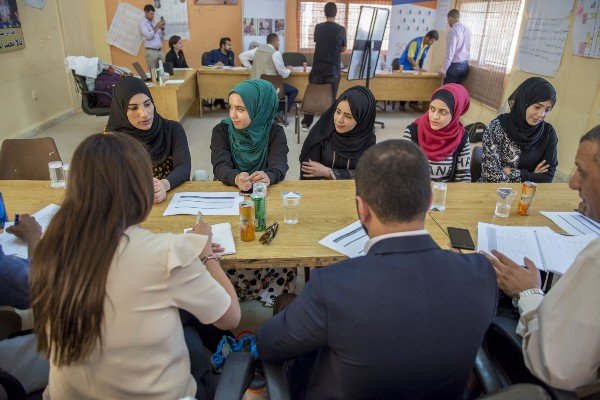This article was originally published on United Nations Foundation's blog, found here.
On a hot, sunny day in August, members of the United Nations Foundation’s Global Entrepreneurs Council visited the Mafraq area of Jordan to meet with local entrepreneurs.
They’re participating in an “emergency employment program” sponsored by the UN Development Programme (UNDP) to connect Jordanians in need of income with training, mentorship, and seed funding for micro-businesses.


In the morning, they attended a pitch session, where participants in the program pitched business ideas and got constructive feedback from a panel made up of local leaders and members of the UN Foundation’s Global Entrepreneurs Council.
A group of five young women between the ages of 20–24 told the council about their plan to establish a kitchen to sell organic, healthy food in the community. They had thought through everything from cooking to marketing to finance. Another young woman shared her plan to reuse old clothes to create and sell new products to the community.
Later in the day, the council met a group of women who had successfully completed the UNDP program and launched micro-businesses.
They had the chance to speak with Manaf Obeidat from Irbid, who started an embroidery business in 2015. She embroiders jewelry, scarves, and dresses, among other products. She’s gotten orders for her products from locations ranging from the United Arab Emirates to as far as the state of Wisconsin.
Even better: She employs women in her community to work with her. She sends them embroidery designs, which they then stitch from their homes.
She told UN Foundation she is proud and enjoying her work, including helping employ and empower approximately 35 local women.
Another woman told them that her business selling clothes would not have happened without help from the UNDP program.


The program in Jordan that supports entrepreneurship is part of UNDP’s work to “promote sustainable livelihoods for vulnerable groups” living in countries affected by crisis, such as the conflict in Syria, which has led to an influx of refugees into Jordan.
According to the UN, there are 656,400 Syrian refugees in Jordan — 78% of whom live outside of camps in local communities. From education to health care to water and sanitation, Jordan’s systems are strained and struggling to provide adequate services to so many people.
The UNDP program aims to expand economic opportunity for Jordanians living in vulnerable households to better cope.
Here is how it works:
In the first phase, participants work on short-term initiatives that improve the local community, such as summer camps for children or installing water treatment systems. In return, they receive a monthly incentive, part of which goes into savings to help start a micro-business. During this time, they also receive training to develop entrepreneurship skills and business training.
Participants who choose to continue to the second phase receive more intensive training to learn how to develop a business plan and manage a business. They then submit business plans, and successful applicants receive funds to establish their micro-businesses.
In the third and final phase, participants launch their businesses and receive technical support, including advice in areas such as value chain development and branding. They are also connected to financial service providers and markets.
From creating and selling pottery to bread to dairy products, the women we met exemplified the power of entrepreneurs to create economic opportunities for themselves and their communities.
After meeting with Jordanian entrepreneurs who participated in the UNDP program, the Chairman of the Global Entrepreneurs Council Ashish J. Thakkar said:
“It has been extremely inspiring to see the work that UNDP is conducting with these entrepreneurs. At the same time, it is very encouraging to see young entrepreneurs and women entrepreneurs who are so energetic, so creative, and so passionate about not only succeeding in their businesses, but making a difference in their communities.”

In 2015, world leaders gathered at the United Nations and adopted 17 Sustainable Development Goals, which together form a promise to create a world without poverty and with opportunity and dignity for all by 2030. Expanding entrepreneurship, especially for people living in communities affected by crisis, will be key to achieving these goals. By helping more people have the tools they need to start their own businesses, the UN is helping to economically empower families and drive economic growth.
To learn more about the work of UNDP, visit undp.org.